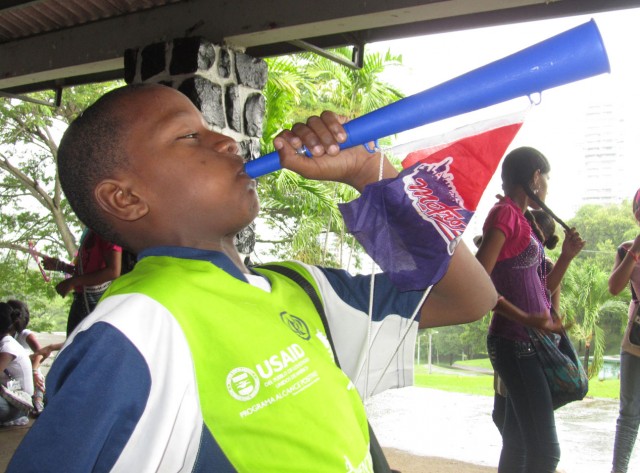
Today, millions of fans from all corners of the world will enjoy one of the most anticipated occasions to whip the masses into a frenzy every four years.
The streets of Brazil will be covered with yellow and green, batucadas and berimbaus will be playing, hearts will beat faster, faces will be painted, flags and signs will wave and national colors proudly worn.
The sound of a whistle will send 22 men in a field running and fighting to send a ball into a 7.32 meters wide by 2.44 meters high net. Brazil’s most modern and cosmopolitan city, Sao Paolo, will host the much-anticipated FIFA World Cup, with the first match—between home team Brazil and Croatia—on Thursday, June 12.
Fútbol (soccer), “the beautiful game,” is considered the most popular sport globally. The game touches on issues of nationalism and identity; a common human experience shared by spectators from many cultures.
That’s one reason fútbol is also used as a tool for working with at-risk youth in some of Creative’s projects in Central America.
“Values through Soccer” is one of Creative’s tools to prevent violence at the community level. Most Central American kids love soccer so it this an ideal tool to captivate youth attention, and teach values while providing training, uniforms and soccer balls. Through this program, youth learn how to be a team player, how to resolve conflict, and more importantly, they learn values that will stay with them as they grow up.
In Panama, the Alcance Positivo program and its partners saw sports as a key vehicle for violence prevention activities. It worked with the Ministry of Public Security to develop sports leagues where community police coached and played with kids from vulnerable neighborhoods. Soccer was a way of reaching out to these kids and really getting to know them.
The Ministry-trained sports staff even went to kids’ homes on non-soccer days to find out more about their lives and their problems.
Alcance Positivo also organized a competition called “Mundialito de Barrios” (Little World Cup of Neighborhoods), a three-month tournament that engaged 6,000 youth in sports and development. It had a real impact: 83 percent of youth who participated reported improved respect of rules/norms and 58 percent of them reported less violent conduct.
In fact Youth Outreach Centers that serve as safe spaces for youth all over Central America use fútbol to present kids with an alternative to joining violent gangs.
“These centers are sanctuaries for children where they can play and learn in safety,” stated U.S. Ambassador to Honduras Lisa Kubiske.
Research has shown us that youth who participate in sports have improved relationships with their families; are more respectful of rules and norms, persevere more in their work; and are less violent.
Fútbol gives at-risk kids like those Creative worked with in Panama exposure to people they might not encounter otherwise. It gives them a sense of belonging. And it provides them with positive alternatives: choosing a ball over a gun; a team over a gang and life over death.
While thousands of at-risk youth continue to benefit from “the beautiful game,” they will not be alone. They are only some of the millions who will forget, at least as they watch the World Cup, about their difficulties and worries.
This World Cup is the perfect time to send a clear message to the world: fútbol is more than just a game.

